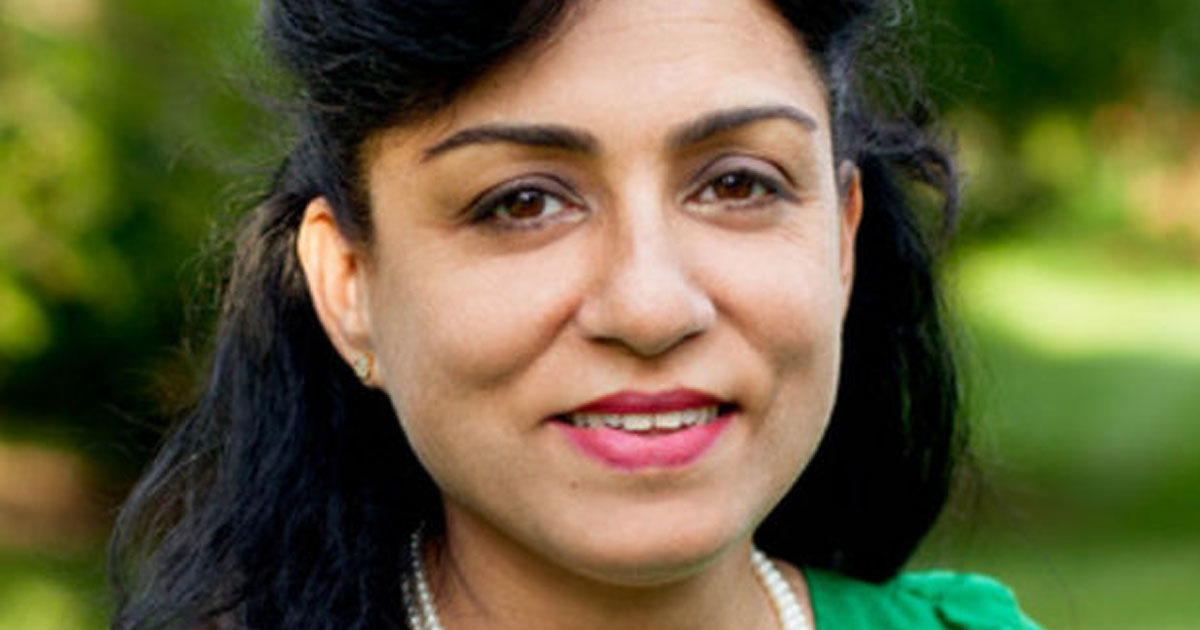Dr. Sonia Dalmia's life story is filled with examples of what most people would call "stepping outside of your comfort zone."
The confidence and determination with which Dr. Dalmia has approached life's challenges she largely attributes to her parents. Today, she is an internationally recognized researcher on the subject of gender and economic equity.
Growing up in India, Dalmia's parents encouraged her academic studies, guiding her to study the field of economics for her bachelor's degree and encouraging her to study abroad to earn an advanced degree. "My upbringing was very different from most girls' in India. My extended family and school never gave me the message that I couldn't do things. I had no restrictions because I was a girl, except for issues of safety."
Dalmia arrived in the United States at age twenty-four, ready to continue her education in economics at the University of Oklahoma. "I didn't know a soul," she recalls, "but I knew I could do it. My parents had instilled in me great confidence." Her parents' unwavering faith that she would be successful gave her faith, as well.
While studying in Oklahoma, Dalmia applied and was accepted to the University of Iowa's doctoral program in economics. The response from her male counterparts—taking bets as to how fast she'd flunk out—was not encouraging. While she had been isolated because of gender while studying in Oklahoma, this was a new low. "In the U.S.," Dalmia notes, "my race has been less of a challenge than my gender."
Dalmia is now a professor of economics at Grand Valley State University—the first woman in the GVSU Economics Department. She began researching and teaching there in 1999, just weeks after the birth of her first child. "My priorities were family, tenure, and publishing," she remembers. She cites the support from her husband, who willingly relocated and worked from home so she could accept the position at GVSU, as well as support from their parents, who came to visit from India to help out, as contributors to her success—including achieving her goals of publication and tenure.
Her marriage is another example of Dalmia's parents' wisdom influencing her life. While she refers to her marriage as "arranged," she also clarifies that she had a choice in the matter. She was twenty-nine, in the third year of her Ph.D. program in Iowa, and her future husband was living in Boston. They began communicating via phone. "He was just so kind. I was blown away by that." She describes an arranged marriage as something that brings together two people of similar background, in terms of religion, education, language, and other important factors. Plus, because she married at a later age, she felt she knew more of what she wanted from life. Eighteen years later, the couple is still happily married, and parents to two children. Recognizing the strength her parents' confidence in her has provided, she says, "Fortunately, I am blessed to have a husband who feels the same way."
As a parent, as an educator, and as a researcher, Dalmia has great insight into the role gender plays in society, along with its economic implications. She notes that while men outnumber women in math-based classes, female students tend to outperform the males—yet the female students have less confidence in their abilities. In terms of removing gender bias from a child's selection of path of study and career choice, Dalmia recommends exposing children to a variety of options, and building a connection between their strengths and good jobs—teaching them to consider return on investment and probability of success, and allowing them freedom to explore. "A bad grade in one class in a field doesn't mean the choice is made," she said. "Don't judge a discipline based on one experience. And understand the value of perseverance."
Dalmia hopes the research she conducts will affect public policy, generate discussion, and keep the subject of gender current, in India and in the United States. "The difference is only in degree, not in kind," she said, in reference to the issues of gender equity both countries face.




